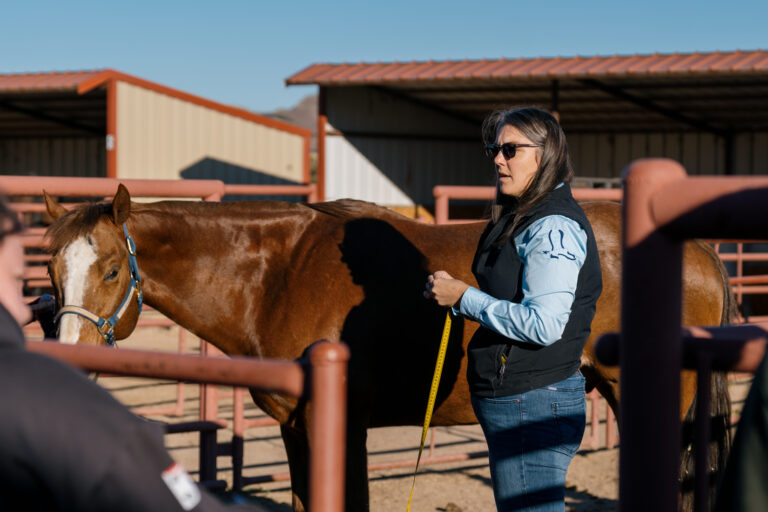One of Colorado State University’s most unique educational environments is located on the city’s western edge in the foothills of the Rocky Mountains.
Led by students and instructors from CSU’s Equine Science program, horses gallop down dirt trails. Just steps from the Overland Trail on the CSU Foothills campus are several facilities that provide hands-on learning experiences for students in the program.
CSU’s Equine Science program is part of the College of Agricultural Sciences. Students have the opportunity to learn about a variety of equine professions and fields of study during the program, allowing for a diverse and well-rounded education.
Equine science students study equine behavior, breeding management, equine event training, reproductive science, equine support services, and more during their time at CSU. While learning, students can interact with horses kept in CSU’s equine facility and gain important real-world experience.
“I feel like there’s something for everyone, and that’s a big deal,” equine science student KJ McCollom said. “With so much on offer, everyone can find their niche, which is really great.”
McCollum wasn’t originally an equine science major and didn’t know anything about the program when she transferred to CSU. She said she enrolled as a psychology student but knew the field of study wasn’t what she wanted. Discovering the equine science program was a defining moment, McCollom said.
“There’s so much knowledge from so many really great educators. The variety of opportunities was also great. From really hands-on, intense training-based classes to very specialized, behavior, nutrition, reproduction, etc. I think it’s a great transition.” – Juliana Browder, Equine Science Student.
“My outlook on my future completely changed and I felt excited for the first time in my life,” McCollom said. “Right away, I thought, ‘Yeah, this is what I’m supposed to do.’ This is what I’m passionate about.”
Students in the Equine Science program come from a variety of backgrounds, and you can join the program regardless of your level of equine experience.
CSU student Julianna Browder, who originally studied at the School of the Art Institute of Chicago, said she knew she had an interest in horses so she enrolled in Northeastern Junior College’s Stallion Starter Program in Sterling, Colorado. After completing the program, Brause said she came to CSU full-time and immediately fell in love with the university.
Colorado State University student Hannah Ellis works on her canter during an English horseback riding session Oct. 22 at CSU’s Equine Science Facility on the Foothills campus. (University | Alia Paul)
“It’s a wealth of knowledge from a lot of really great educators,” Browder said. “The variety of opportunities was also great. I think it’s great to be able to move from really hands-on, intense training-based classes to very specialized classes like behavior, nutrition, reproduction, etc.”
Mr McCallum and Mr Browder believed the hands-on learning environment advanced their education in a beneficial way, and equine science lecturer Sarah Matlock said this was a key part of the students’ success. .
“I think the diversity of our courses and the variety of levels of instruction really allows us to meet the needs of all students, with or without equine experience,” Matlock said.
Students participate in the center’s experimental courses and work with horses in a variety of programs. Lecture-style classes are also held in classrooms on the premises. Outside of the course, students are also able to visit and observe classes, giving them the opportunity to see what else the program has to offer.
“I spend a lot of time at the (Temple Grandin) Equine Center,” McCollom said. “Even if you’re not participating in a class, you can feel free to come and visit and observe the applied classes being held here and there, so it’s a great space.”
The program’s education extends beyond equine science. Many students learn more about themselves because of the time they spend with horses.
“It’s amazing to experience how much horses can teach people about themselves,” Browder said. “What does it take to find the patience when they won’t listen to you, or how to stay at peace with yourself and not overthink while going through this difficult situation?” I’m learning.”
As an instructor, Matlock said she sees most of her students discover something new about themselves while working with horses.
“Knowing about the challenges horses can face emotionally and learning on the field helps us learn a little bit more about some of the challenges we might face,” Matlock said. Ta.
The wide range of opportunities available to students also provides many connections to industry and the community as well, which McCollom was able to engage directly through the program’s event management course.
As part of the course, McCollom worked on outreach and marketing for the horse experience event, which will be held Nov. 2 at Adams Atkinson Arena.
“Overall, it’s kind of a big educational event about horses in general and what our program is all about,” McCollom said.
This event is open to the public and is designed to showcase the unique opportunities and experiences in the equine science program.
“I really like the accessibility of this program in that it gives students who maybe didn’t grow up in an agricultural environment an opportunity to learn about horses,” Browder said. “It also gives us a great opportunity to help educate and expose others to farming and horses.”
Contact Hannah Parcells at science@collegian.com or on Twitter @hannahparcells.


